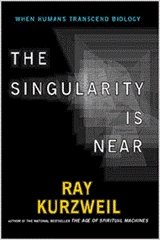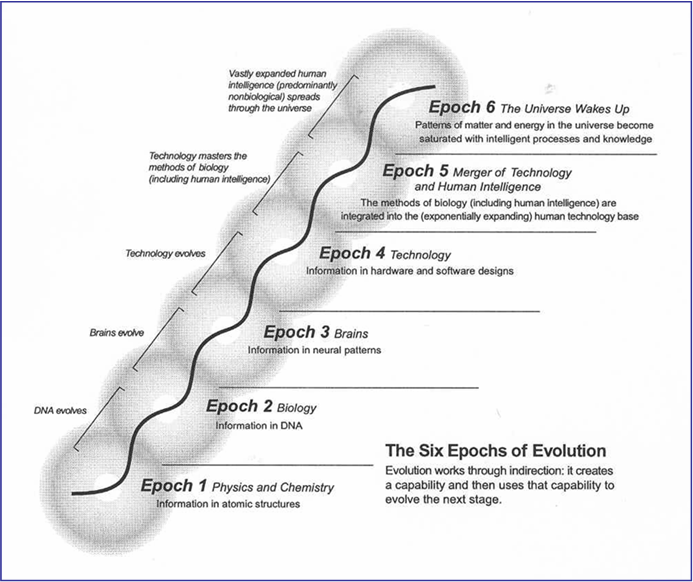When humans transcend biology
by Ray Kurzweil
Reviewed by Brian Wright
 Original posting 11/28/2007
Original posting 11/28/2007
Speaking of watershed books of the life extension movement—that’s the comment I made about Engines of Creation, the previous book I reviewed—Ray Kurzweil’s magnum opus on the imminent promise of human-life enhancement technology has arrived. Actually it arrived a couple of years ago, but it’s taken me a while to get around to reading it.
Without exaggeration The Singularity is Near will likely become the preeminent futurist technology book of the 21st century. Whether Kurzweil’s predictions come to pass or not, I simply cannot imagine any subsequent tome topping this one—in depth of detail, in comprehensiveness, in (trans)humanitarianism, or in elegant flow of logic. And tome it is: note I felt obligated to state in the page count above that the book has 100 pages of discursive notes… followed by a 50 page index!
Authors of technical material will tell you the size and quality of an index is directly proportional to the clarity of knowledge communicated by the author.
Let’s cut right to the chase. What is the Singularity?
“[It’s] a future period during which the pace of technological change will be so rapid, its impact so deep, that human life will be irreversibly transformed. Although neither utopian nor dystopian, this epoch will transform the concepts that we rely on to give meaning to our lives, from our business models to the cycle of human life, including death itself.” — Page 7
 Early in the document, Kurzweil presents the Six Epochs of Evolution using a simple graphic shown on the right. It’s really a cool summary of what he’s going to demonstrate in the book, with the little spheres (representing the galaxy?) and lines representing S-curves for growth trends of new technologies. Since I doubt anyone can see the detail on the graphic, here are the epochs:
Early in the document, Kurzweil presents the Six Epochs of Evolution using a simple graphic shown on the right. It’s really a cool summary of what he’s going to demonstrate in the book, with the little spheres (representing the galaxy?) and lines representing S-curves for growth trends of new technologies. Since I doubt anyone can see the detail on the graphic, here are the epochs:
| Epoch 1 | Physics and Chemistry Information in atomic structures |
| DNA evolves | |
| Epoch 2 | Biology Information in DNA |
| Brains evolve | |
| Epoch 3 | Brains Information in neural patterns |
| Technology evolves | |
| Epoch 4 | Technology Information in hardware and software designs |
| Technology masters the methods of biology (including human intelligence) |
|
| Epoch 5 | Merger of Technology and Human Intelligence The methods of biology (including human intelligence) are integrated into the (exponentially expanding) human technology base |
| Vastly expanded human intelligence (predominantly nonbiological) spreads through the universe | |
| Epoch 6 | The Universe Wakes Up Patterns of matter and energy in the universe become saturated with intelligent processes and knowledge |
The Singularity basically occurs at the intersection of Epoch 4 with Epoch 5. A shorthand phrase for the Singularity is “human-machine convergence,” with appropriate qualifications placed on what it means to be human and/or machine.
So roughly at the midpoint of the 21st century, individual humans en masse will have advanced in intelligence and have improved our bodies to such an extent (through genetic- and molecular-engineering techniques) that we’ll have migrated our biological consciousnesses into nonbiological forms of our own choosing… though many will no doubt opt for keeping the human form… and I’m sure most of these opters will prefer the souped-up body that doesn’t succumb to arthritis, hearing loss, or ED.
Can you imagine what superior physical capabilities will mean to the field of athletics?! Tiger Woods, watch out.
The more practical, more immediate effects of approaching the Singularity are radical physical/mental health improvements and the conquest of aging. (By the way, Kurzweil seems to be predicting effective immortality ~2025±5.) A lot of people are still hanging back on what would seem to be a natural desire to live vigorously, youthfully, indefinitely. Why? In Fantastic Voyage Kurzweil writes:
“Whereas some of my contemporaries may be satisfied to embrace aging gracefully as part of the cycle of life, that is not my view. It may be ‘natural,’ but I don’t see anything positive in losing my mental agility, sensory acuity, physical limberness, sexual desire, or any other human ability. I view disease and death at any age as a calamity, as problems to overcome.”
— Page 210
Perhaps our philosophies and religions have had to come up with some sort of answers to aging and dying for so long, we resist letting go of the supposed necessity that invokes these answers. In the Coffee Coaster, I’ve visited the liberating idea of radical life extension in some of my book reviews—Fantastic Voyage, The Prospect of Immortality, and Engines of Creation—and and more recently in a column on cryonics. As Kurzweil states, it’s a lonely battle out there on the leading edge of the “vitalist/extropist” curve:
“Being a Singularitarian has often been an alienating and lonely experience for me because most people I encounter do not share my outlook. Most “big thinkers” are totally unaware of this big thought. In a myriad of statements and comments, people typically evidence the common wisdom that human life is short, that our physical and intellectual reach is limited, and that nothing fundamental will change in our lifetimes. I expect this narrow view to change as the implications of accelerating change become increasingly apparent, but having more people with whom to share my outlook is a major reason that I wrote this book.”
— Page 370
Thanks, Ray. With Singularity you’ve not only made more friends, you’ve combined a tour de force and coupe de grâce for the inspiration of rationally idealistic people everywhere. I expect one day, just as we talk about the Christian era in terms of BC and AD, we’ll have another basis for gauging the centuries: BK and AK. Kurzweil does a lot of heavy lifting, systematically demonstrating the realities of the new technology, even some current concerns about environment and energy. We have reason to be optimistic. In particular, clean energy costs will drop and availability will rise:
“Today solar power costs an estimated $2.75 per watt. Several companies are developing nanoscale solar cells…. Industry sources indicate that once solar power falls below $1.00 per watt, it will be competitive for directly supplying electricity to the nation’s power grid. Nanosolar [company] has a design based on titanium oxide nanoparticles that can be mass-produced on very thin flexible films. CEO Martin Roscheisen estimates that his technology has the potential to bring down solar-power costs to around 50 cents per watt by 2006[1], lower than that of natural gas. Competitors Nanosys and Konarka have similar projections.”
— Page 250
So in the leadup to the Singularity lie such important matters as cleanup of pollution and resolution of global warming caused by fossil-fuel carbon-dioxide emissions. Not an insignificant issue, as I’ve also discussed in several reviews.[2]
“Of the three primary revolutions underlying the Singularity (genetics, nanotechnology, and robotics (GNR)), the most profound is R, which refers to the nonbiological intelligence that exceeds that of unenhanced humans. A more intelligent process will inherently outcompete one that is less intelligent, making intelligence the most powerful force in the universe.” — Page 260
Hard to believe intelligence will someday rule the world, at least from our current vantage point here in the murky shadows of George Bush, Sean Hannity, and Bill O’Reilly. But once we purge the world of pathocracy of all varieties and achieve the vision of decentralized voluntary communities, success will become straightforward.
To describe the panorama of fundamental observations made by Mr. Kurzweil would require a substantial book in itself. He begins by justifying the principles of technological evolution and the Law of Accelerating Returns, spends two chapters describing how to achieve the computational capacity of the human brain, outlines the impact on the human body or other enhanced intelligence-carrying framework, several sections on how to best contain or thwart the perils of malevolent strong AI (artificial intelligence), and finally some deep insight-laden essays on consciousness and Singularity as Transcendence.
“…Singularitarianism is not a system of beliefs or unified viewpoints. While it is fundamentally an understanding of basic technology trends, it is simultaneously an insight that causes one to rethink everything, from the nature of health and wealth to the nature of death and self.” — Page 371
 “Ich bin ein Singularitarian!”
“Ich bin ein Singularitarian!”
For Christmas, think about giving The Singularity to someone you love and want to be around for a long time.
###
[1] A quick Web search here in late 2007 reveals factories are being built, but author could not locate current or imminent cost per watt data.
[2] CC reviews of books The Weather Makers, Crimes against Nature, This Moment on Earth, Unstoppable Global Warming, and movies Who Killed the Electric Car, The Corporation, and An Inconvenient Truth.
This post has been read 18053 times!


